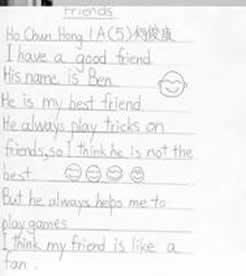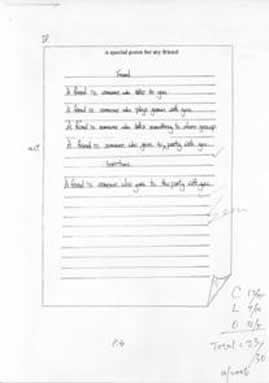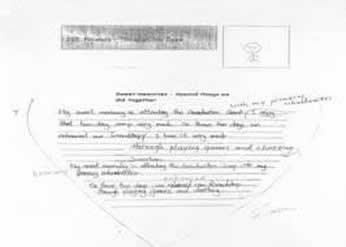Background
- The school has an intake of students with different language abilities. The problem of learner diversity is also quite acute. Tasks need to be broken down into smaller tasks.
- To foster a smooth interface between P6 and S1, English teachers wanted to design an interesting first unit to enable students to get to know each other, set goals to manage their lives better and develop basic self-management skills.
- The task (i.e. designing a homepage) requires students to do a variety of activities that include goal setting, poem writing and reflecting on family, social and school life.
|
| |
| Objectives
Students
- Develop students' basic self-management skills by helping them set goals for self-improvement
- Develop students' creativity and interest in learning English through poem appreciation and poem writing activities
- Develop students' basic reflection skills by giving them opportunities to reflect on their family and social life as well as to plan ahead for their studies at school
Teachers
- Move away from a very textbook-bound approach to a task-based approach in planning and covering a unit
- Develop professional knowledge and skills in using language arts elements (e.g. use of similes, poem appreciation, use of language arts to develop students' experience strand, etc.)
Curriculum
- Integrate language arts coherently into a task-based unit
- Cater for learner diversity by breaking a big and cognitively demanding task into smaller tasks that weaker students find manageable
|
| |
Implementation
No of Lessons |
Teaching plan |
Purpose |
10 lessons |
Pre-task activities for part I of the homepage "Getting to know me"
- Conduct an ice-breaking activity to help students get to know each other
- Teach vocabulary items on hobbies & adverbs of frequency. Give consolidation exercises
- Ask students to do weekly logs on hobbies and to present them orally in class.
- Explain the purpose and context of the task "Designing my homepage"

- Ask students to complete the two mindmaps
 – "I am good" vs "I am bad" and share how they can improve bad habits in groups / in pairs – "I am good" vs "I am bad" and share how they can improve bad habits in groups / in pairs
- Teach Wh-questions and give practice
- Teach names of different relationships
- Ask students to compare their family members with people, animals or objects and design a special family tree using different analogies and pictures
- Ask students to dolistening activities related to school and home
- Ask students to read a homepage in the textbook and do comprehension questions
- Complete the first part of the homepage "Getting to know me"
|
- Spark students' interest in learning English using ice-breaking activities
-Help students get to know the task to be done
-Systematically scaffold students' knowledge to help them complete the different parts of the album / homepage |
8 lessons |
Pre-task activities for Part II of the homepage "Going to school"
- Revise names of subjects and people at school
- Read the selected paragraphs from the comprehension passage
- Ask students to find out classmates' favourite subjects and explore the school campus in pairs/groups to complete the worksheets. Present findings orally in class
- Ask students to design ‘My ideal timetable' ("My weekly timetable) & present the timetable individually or in groups
- Conduct a survey and complete a mindmap on school life using Wh-Q
- Ask students to set short-term goals for 2014-2015 and explain how they can achieve them
- Complete the second part of the homepage "Going to school"
|
- Help students reflect on school life and set goals |
5 lessons
|
Pre-task activities for part III of the homepage "My Friends - Through my eyes"
- Teach adjectives to describe a person's character
- Show students examples of acrostic poems
 and other poems and other poems
- Ask students to create an acrostic poem /a short poem for a friend in groups
- Teach past tense and ask students to use it to describe an event about his/her friend
- Brief students on how to complete the final design of their homepage. Encourage them to produce a creative design of their homepage.
- Complete the third part of the homepage "Friends – Through my eyes"
|
- Develop students' creativity and experience strand |
2 lessons |
Pre-task activities for Part IV of the homepage "My Future (*an optional part for more able students)
- Brainstorm jobs that students want to do and teach vocabulary items on occupations. Brainstorm ways to achieve the goals
Ask students to set long-term goals for the future (*optional task for more able students)
- Complete the fourth part of the homepage "My future"
- Display students' homepages and compile them to produce a class album
|
-Provide extended activities for more able students |
|
| |
Students' work:
Examples of students' products
Extracts of students' work on the part "Getting to know me" in the homepage
|
Typed version of a student's special family tree
1. My father is like a devil. He makes people feel horrified.
2. My mother is like an angel. She always buys things [for] me.
3. My elder sister is like my best friend. She always talks to me.
4. My younger sister is like a lovely flower. She always [loves beautiful] things.
5. My grandma is like a god. She always gives me some money.
6. My niece is like a pleasant doll. She always laughs.
7. My aunt is like a Santa Claus. She sometimes buys presents [for] me.
8. My uncle is like a clown. He always makes jokes. |
 |
Typed version of a student's special family tree
My father is like a clown. He is funny.
My mother is like a cook. She cooks well.
My brother is like a devil. He is fierce.
My sister is like a lovely baby. She is cute.
My grandma is like an angel. She is kind.
My aunt is like a dictionary. She is clever.
My uncle is like a bee. He is hardworking.
My cousin is like my best friend. He talks to me a lot. |
 |
Typed version of a student's special family tree
Getting to know my good hobbies
I have a good hobby. It is surfing the Net. I like surfing the Net because it is fun. The advantage of surfing the Net is that I can know more science [knowledge]. After I have known some science, I can share it with my classmates and my friends.
Getting to know my bad habits
I have a bad habit. It is not paying attention in class. I want to improve it because I want to do the best. I will sleep early every night. I want to take heed of teachers' instructions so that I can have good examination results. |
Extracts of students' work on the part "Going to school" in the homepage
Extracts of students' work on the part "Friendship – Through my eyes" in the homepage
|
Typed version of a student' s work on "Sweet memories – Special things we did together"
My sweet memory is attending the Graduation Camp with my primary schoolmates. I [enjoyed] that two-day camp very much. On those two days, we enhanced our friendship through playing games and chatting. I love it very much. |
 |
Friend (typed version)
I have a good friend.
His name is Bed.
He is my best friend.
He always plays tricks on friends.
So I think he is not the best.
But he always helps me to play games
I think my friend is like a fan |
Friend (typed version)
A friend is someone who talks to you.
A friend is someone who plays games with you.
A friend is someone who [cheers] you up
A friend is someone who goes to parties with you. |
|
 |
An example of worksheets on "I am good vs I am bad"


|
|
Impacts
- The majority of students found the task of designing such a large scale homepage manageable as the task was broken down into smaller tasks. Even weaker students were able to complete all the three parts in the homepage whereas a small number of more able students were able to complete the last part "My Future" in the homepage.
- Students were taught different knowledge and skills at different stages. There was very systematic scaffolding of knowledge and skills in the process to help students complete different parts of the homepage.
- It was the first time that English teachers adopted a task-based approach to covering a unit. They moved from a completely textbook-bound approach to a student-centred approach. In the process, they saw the value of giving a context and a purpose to the task and their mindsets about task-based learning have been changed.
- The task designed was considered meaningful to both students and teachers. Instead of repeating the same old theme "At School" which S1 students came across in primary education, they were able to explore the theme from a different aspect – management of one's life. The tasks were challenging, yet they are pitched at students' level. Students' imagination was also stretched when making analogies in the special family tree and writing poems for friends. Their basic self-management skills were also developed through goal-setting activities.
|
| |
Acknowledgements
- Ms. Venus Wong
- Ms. Elaine Choy
- Ms Irene Chan
- Ms Stephanie Chung
- Ms. Cindy Lam
- Mr. Lawrence Choi
- Mr. Jason Wong
|
| |








